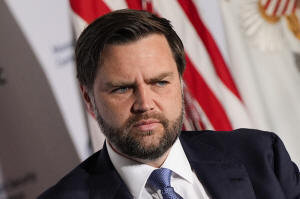Vance says Russia was 'asking for too much' in its initial Ukraine peace
offer
[May 08, 2025]
By MICHELLE L. PRICE
WASHINGTON (AP) — Vice President JD Vance said Wednesday that Russia was
“asking for too much” in its initial peace offer as the United States
looks to bring about an end to the war in Ukraine.
The vice president, speaking at a Washington meeting hosted by the
Munich Security Conference, did not elaborate on Moscow's terms, but
said he was not pessimistic about the possibility of a peace deal. That
is a more sanguine assessment than President Donald Trump's recent
skepticism that Russian President Vladimir Putin wants to end the war
that begin in February 2022 when Russia invaded.
“I wouldn’t say that the Russians are uninterested in bringing this
thing to a resolution,” Vance said. “What I would say is right now: the
Russians are asking for a certain set of requirements, a certain set of
concessions in order to end the conflict. We think they’re asking for
too much,” he said.
Trump, when asked later Wednesday about the vice president's comments,
told reporters at the White House, “Well, it’s possible that’s right."
He seemed to imply that Vance had details that he did not have because
he was preoccupied with other matters.

“We are getting to a point where some decisions are going to have to be
made. I’m not happy about it," Trump said of the peace effort.
Vance did not repeat any of the criticisms of Volodymyr Zelenskyy that
Vance had aired during an Oval Office blowup in February with the
Ukrainian leader, and he made a point of saying the U.S. appreciated
Ukraine's willingness to have a 30-day ceasefire. But the Republican
vice president, citing Russia’s unwillingness on that point, said the
U.S. would like to move past that and have the Russian and Ukrainian
leaders sit down directly to negotiate a long-term settlement that would
end the fighting.
“What the Russians have said is, ‘A 30-day ceasefire is not in our
strategic interests.’ So we’ve tried to move beyond the obsession with
the 30-day ceasefire and more on the, what would a long-term settlement
look like,” Vance said.
[to top of second column]
|

Vice President JD Vance speaks at the Munich Leaders Meeting,
Wednesday, May 7, 2025, in Washington. (AP Photo/Julia Demaree
Nikhinson)

Vance's talk at the conference event followed his appearance at the
organization's February summit in Germany, where he ruffled feathers
for his comments that free speech is “in retreat” across Europe.
Vance addressed that Wednesday and said his comments applied to the
U.S. under Democratic President Joe Biden’s administration, just as
they did to Europe.
“It’s not ‘Europe bad, America good.’ It’s that I think that both
Europe and the United States, we got a little bit off track, and I
encourage us all to get back on track together,” he said.
On the Middle East, Vance did not shed light on the timing of
planned talks between the U.S. and Iran over Iran's nuclear program.
He said the Trump administration felt the inspection and enforcement
provisions in the 2015 Iran nuclear deal negotiated under Democratic
President Barack Obama were “incredibly weak” and “allowed Iran to
sort of stay on this glide path toward a nuclear weapon if they flip
the switch and press go.”
“We think that there is a deal here that would reintegrate Iran into
the global economy, that would be really good for the Iranian
people, but would result in the complete cessation of any chance
that they can get a nuclear weapon. And that’s what we’re
negotiating toward,” Vance said.
All contents © copyright 2025 Associated Press. All rights reserved
 |